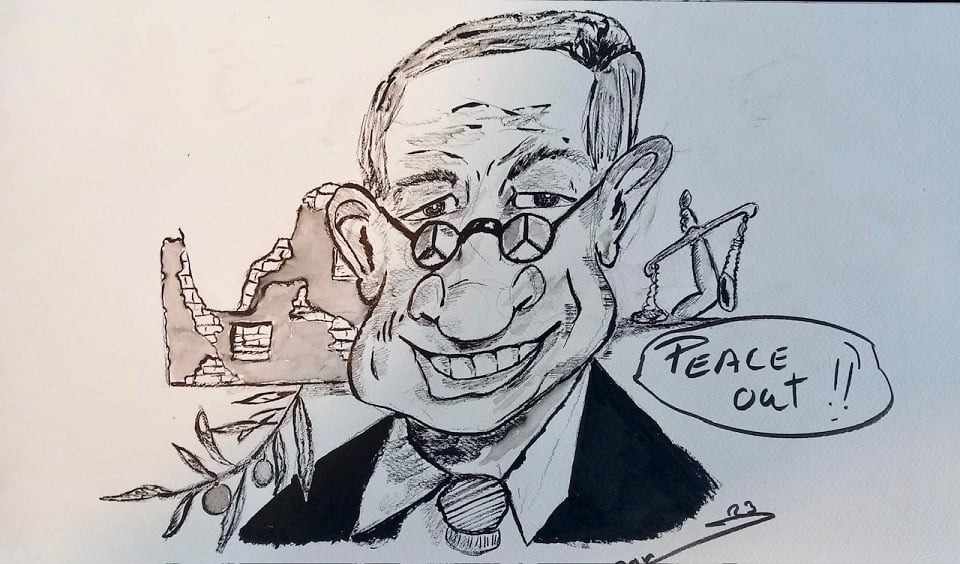
Saudi Crown Prince Mohammed Bin Salman’s (MBS) plans to reform and strategically reposition his country in the Middle East have taken yet another significant turn. After restoring diplomatic ties with Iran earlier this year, it is now evident that a peace deal with long-time foe Israel looms. An unprecedented move that will turn MBS into the uncontested leader of a new Middle East.
By Arthur Blok
A leader who could, for example, enforce a breakthrough in the ongoing Israeli-Palestinian conflict. A leader who could potentially end the lingering Lebanese crisis and give the Lebanese some of their dignity back.
Just like was the case with the China-brokered deal with Iran in late March, the behind-the-scenes- negotiations at the United Nations General Assembly this month between the Saudis and Israelis are a clear message to the rest of the world: we are taking matters into our own hands.
Israeli Prime Minister Benjamin Netanyahu could barely control his enthusiasm during his speech and emphasised his administration was ‘at the cusp’ of such a historic agreement. The Israeli premier can use some good news to show his electorate, just like American President Joe Biden, who does not seem to be in control of anything on both the domestic and international stage.
The Saudi Crown Prince uses that status quo to cement a peace agreement that will benefit his country and a region that has been like a rudderless ship for decades.
A brilliant move indeed.
Peace is the only way forward for a region that has paid a disproportional high price for centuries of geopolitical battles between large power blocks such as the former Soviet Union (Russia) and the United States. And, on a regional level, fought bloody proxy wars in countries like Lebanon, Syria and Yemen.
It is all caused by a lack of charismatic leaders who did not have the balls to sit at a table and seriously discuss peace, fearing what others from whom they financially and ideologically depend might say.
This is not the case with Mohammed Bin Salman in charge of Saudi Arabia. He is the man who gets things done.
That is precisely what is needed at this moment.
Since he came to power in 2015, the Kingdom has undergone a social and cultural metamorphosis. So far, he is living up to all his promises to improve the lives of ordinary Saudis, particularly that of women who now take up a more effective and equal position in society.
In addition, MBS focuses on innovation to move the country's economy past its dependence on crude oil, of which it is the world’s largest exporter. From this perspective, it’s vital to integrate economically with Israel, which has become a powerhouse in the technology industry.
The Abraham Accords
A potential Israeli-Saudi peace will significantly impact the stability in the Middle East. The trend of peace was set in August 2020 when the Administration of then-president Donald Trump brokered The Abraham Accords between Israel and the United Arab Emirates (UAE).
The joint statement between Israel, the UAE, and the United States marked the first public normalisation of relations between an Arab country and Israel since Egypt in 1979 and Jordan in 1994 signed similar agreements.
Soon after, Bahrein followed suit; in the same period, Sudan and Morocco established diplomatic ties with the Israelis. Saudi Arabia and Oman would have probably done the same if it had been for a second Trump term.
In that light, peace with the Saudis is also a logical next step.
Saudi-Israeli peace comes with numerous social, economic and strategic benefits. The latter is much coveted by Riyadh, who need the US's blessing to expand their defence capabilities substantially. The Saudis are eager to buy advanced fighter jets and the new S-500 air defence system.
At the same time, peace will help secure US - and Israeli - support in developing a civilian nuclear program that could one day be used to create atomic weapons.
Peace will pave the way to ending the endless Arab-Israeli conflict. It will encourage other Arab States to normalise their relations with Israel. No matter how one sees it, if any country can play a decisive role in the reconciliation between Judaism and Islam, it is Saudi Arabia.
For the US, the deal is a unique chance to push back against China’s rising profile in the Mideast. It would help their key ally, Israel, integrate with its neighbours and strengthen an anti-Iran alliance, with the US in a central role.
A completed peace deal would be a win-win for all major regional actors and an unprecedented foreign policy accomplishment for Mohammed Bin Salman and his negotiations team.
A deal that is worthy of a Nobel Peace Prize.






